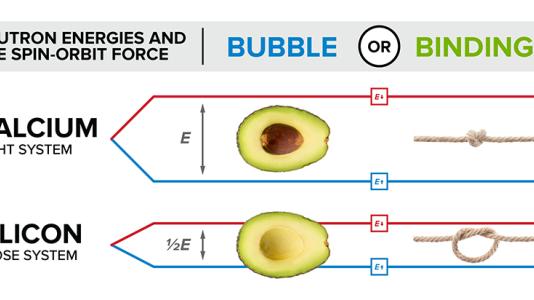
Scientific achievement
This work shows that the decrease in the spin-orbit splitting between the neutron p-states outside the N = 20 closed neutron shell in 41Ca, 39Ar, 37S, and 35Si is a result of the change in the binding energy of the spin-orbit partners with respect to the neutron threshold.
Significance and impact
Researchers have calculated that effects on the energies of excitation in nuclei can depend on how tightly the last neutron or proton is bound. The present collaboration showed that a geometric effect that causes the separation between two excitations to change can explain experimentally observed effects with no need to assume exotic “bubble” influences.
Research details
- Researchers described the changes observed experimentally for 1p3/2 and 1p1/2 states from Ca to Si in terms of the proximity of the 1p1/2 orbital to the neutron threshold.
- To explore such effects, researchers carried out calculations with a Woods-Saxon potential using the code of Volya [1] and several established parameter sets characterizing the neutron-nucleus potential.
Work performed at 1Argonne National Laboratory and 2Lawrence Berkeley National Laboratory by B.P. Kay1, C.R. Hoffman1, and A.O. Macchiavelli2, Phys. Rev. Lett., 119, 182502 (2017) DOI: https://doi.org/10.1103/PhysRevLett.119.182502
This research was funded by the U.S. Department of Energy’s Office of Nuclear Physics.
Reference
[1] A. Volya, http://www.volya.net.
Argonne National Laboratory seeks solutions to pressing national problems in science and technology. The nation’s first national laboratory, Argonne conducts leading-edge basic and applied scientific research in virtually every scientific discipline. Argonne researchers work closely with researchers from hundreds of companies, universities, and federal, state and municipal agencies to help them solve their specific problems, advance America’s scientific leadership and prepare the nation for a better future. With employees from more than 60 nations, Argonne is managed by UChicago Argonne, LLC for the U.S. Department of Energy’s Office of Science.
The U.S. Department of Energy’s Office of Science is the single largest supporter of basic research in the physical sciences in the United States and is working to address some of the most pressing challenges of our time. For more information, visit https://energy.gov/science.